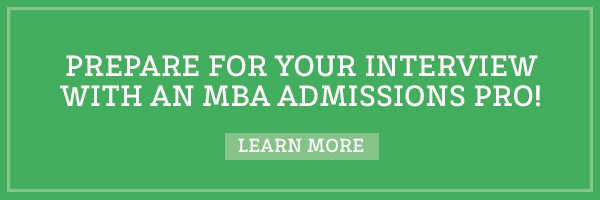
If you’re like many of my EMBA clients, it’s been quite a while since you’ve interviewed – at least as the interviewee. And if you have recently sat in the hot seat, it’s been for a job interview, not a school interview. Most EMBA applicants have strong interpersonal and communication skills (otherwise, you wouldn’t be where you are professionally), and so theoretically needn’t worry about the interview. Yet the unfamiliarity with the situation triggers nerves. In addition, you’re probably applying to only 1-2 programs, giving each interview great weight – no room for error!
One simple way to alleviate those nerves and get in the EMBA interview groove: prep and practice! It can be casual prep or it can be more involved, whatever works for you.
In coaching EMBA applicants for interviews, I’ve identified the unique challenges and distinction of the EMBA interview process. Here is a summary plus tips on how to deal with them.
When in the process will you interview?
This will affect your approach and preparation. (While most EMBA interviews occur after you have submitted your application, some, such as NYU and sometimes Wharton, occur before.)
• If you interview before submitting, don’t just jump into it without thinking through your “story” and your goals. What you write later in the application must align with what you say initially.
• If you interview after submitting, you’re immersed in your story and goals from the app writing process. Be careful not to sound like you’re reciting your application – your challenge here is to be fresh and engaged.
Blind interview or not?
A blind interview is one where your interviewer has not read your application, only possibly your resume – or as Kellogg currently does, you’ll bring your resume to the interview. Most EMBA interviews are not blind – the interviewer will have read your application.
• For blind interviews, you’re essentially a blank slate in the interviewer’s eyes. Your challenge is to impart a distinct, compelling impression that will leave the interviewer enthusiastic and interested. Bring stories and points to the table that will create that impression, and work them into your answers. If you’ve completed your application, you can use examples and stories in it, because they will be new to the interviewer.
• For non-blind interviews, expect questions probing your application, and do not reiterate stories and examples from your application; have some new examples/anecdotes at hand. Also, review your application shortly before interviewing, so that you remember it well.
Types of questions to prepare for
You should be ready for anything. Still, there are types of questions that almost always pop up.
• Open questions such as “So, tell me about yourself” or “Please walk me through your resume” are common as openers. For the latter, avoid going on too long, repeating every item – a common pitfall. Rather, summarize your career trajectory and zoom-in on 1-2 key points to add value, e.g., an important decision or learning/growth experience. Give more emphasis to recent positions. Actually, I suggest always preparing a “Tell me about yourself” reply – it requires you to identify key points about your candidacy, which helps you strategize overall. It’s a great interview prep exercise.
• Since EMBAs are part-time programs, expect a question about how you will balance and fit school into your work and life – be specific and practical. Acknowledge the challenge and show you’re prepared.
• For open questions like “What is your leadership style” or “What are your strengths and weaknesses as a manager” don’t just explain, but also give a brief example. For EMBA strategy questions, find examples/stories that show you in a high-level role and/or dealing with high stakes issues, to underscore your appropriate level.
• Also, there may be behavioral questions: “Describe a time when…”; essentially stories. The key is answering with enough detail to make the story meaningful and interesting but not drag on too long. Again, for EMBA strategy, select stories that reflect higher level, higher stakes situations and responsibilities or that reflect distinctive aspects of your candidacy.
• Goals questions are almost inevitable. Be consistent with your application, and indicate why you want to pursue that path – share your motivation with the interviewer. What do you hope to do during and after your EMBA that you can’t do now?
• Why the program, why an MBA: everybody loves to be loved – including EMBA adcoms. Let your enthusiasm for the program show! Cite program details that excite you, connecting the program to your goals and professional growth needs. If it’s a non-blind interview, do bring in some new points.
Beyond these, there are often questions about your industry, your function, your work culture, etc.
A few final tips
• STRATEGIZE: Think about your candidacy and what points you want to make – then during the interview find opportunities to weave those points into your discussion.
• Nudge the interview toward dialogue, rather than just interrogation style Q&A.
• Use social IQ to adapt to the interviewer’s style, tone, interest level, etc.
Good luck and enjoy the interview – it should be an enjoyable conversation. If you’d like coaching or practice before the big day – that’s what I’m here for!
Cindy Tokumitsu has advised hundreds of successful applicants, helping them gain acceptance to top MBA and EMBA programs in her 15+ years with Accepted. She would love to help you too. Want Cindy to help you get Accepted? Click here to get in touch!
Related Resources:
• Excellent Executive MBA Admissions Advice, podcast interview
• 6 Steps to Better Self Knowledge & a Successful MBA Interview
• Do I Really Need a Mock Admissions Interview? [Short Video]
The post EMBA Interview Tips You Need to Get Accepted appeared first on Accepted Admissions Blog.
from Accepted Admissions Blog
http://blog.accepted.com/emba-interview-tips-need-get-accepted/


No comments:
Post a Comment